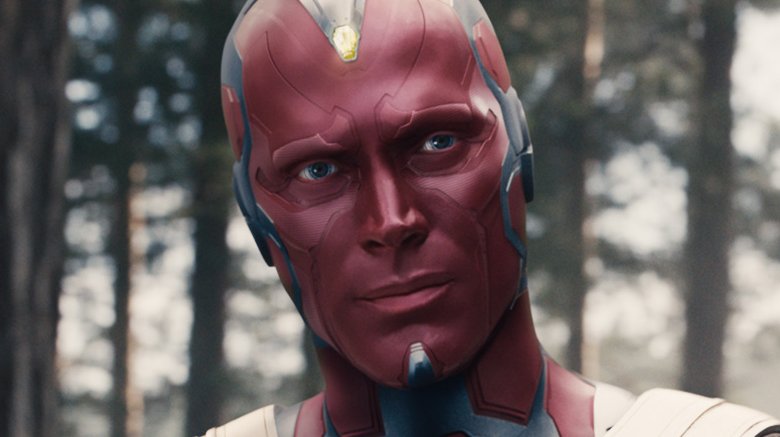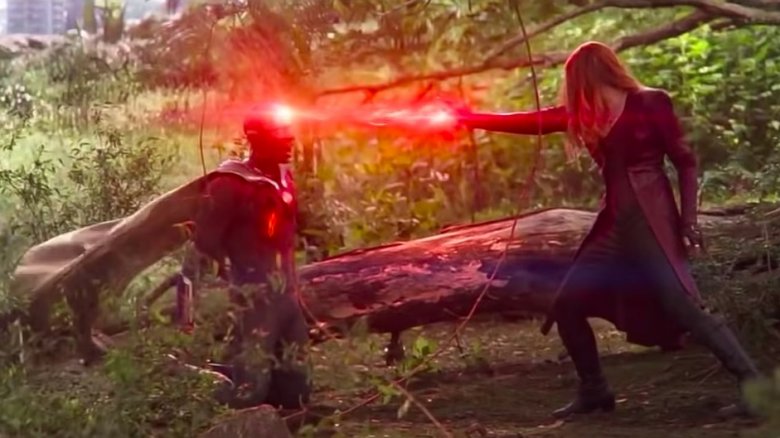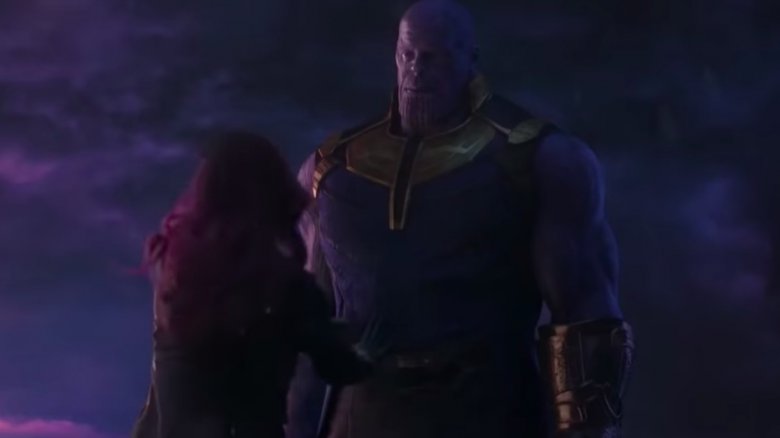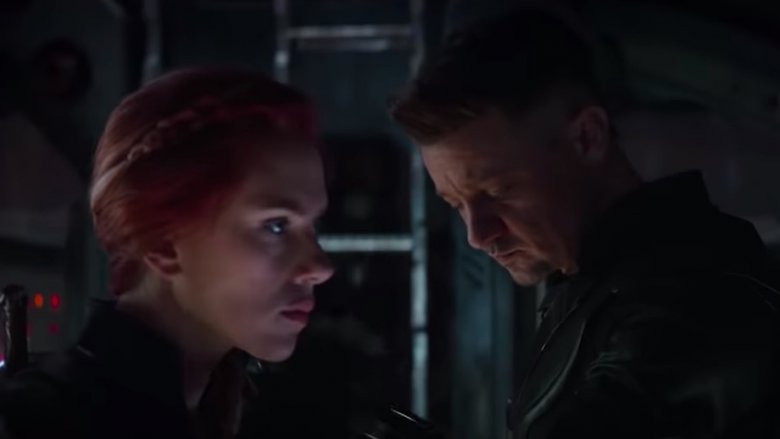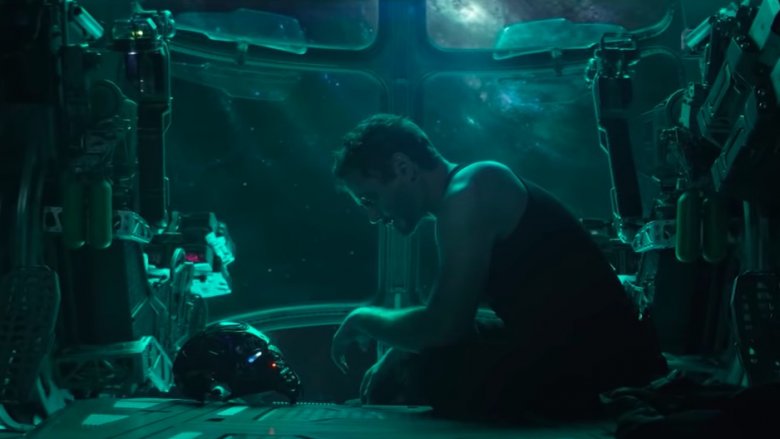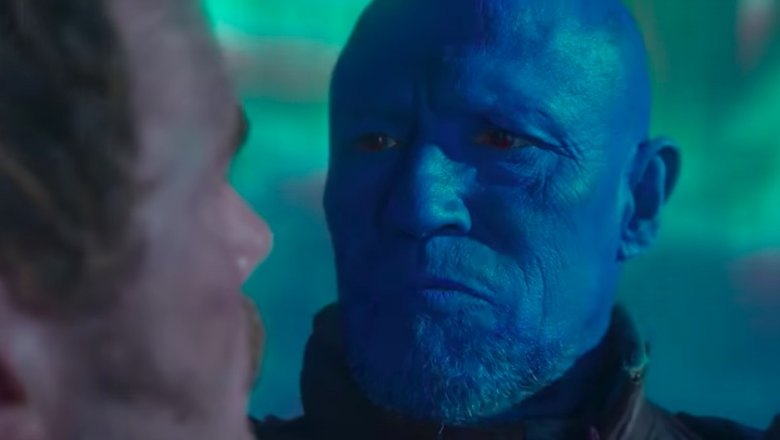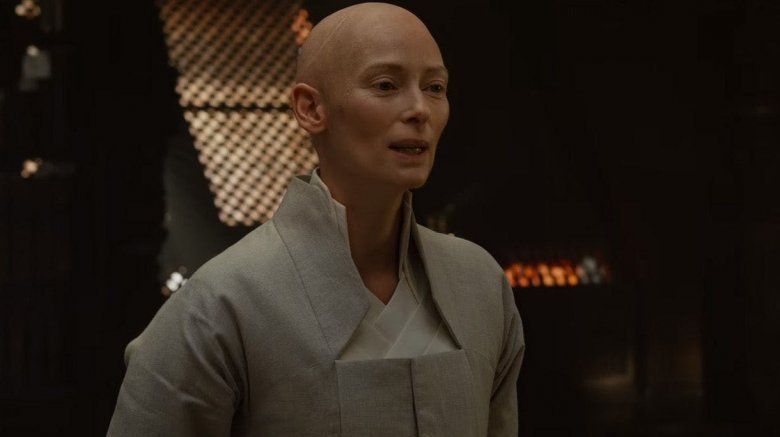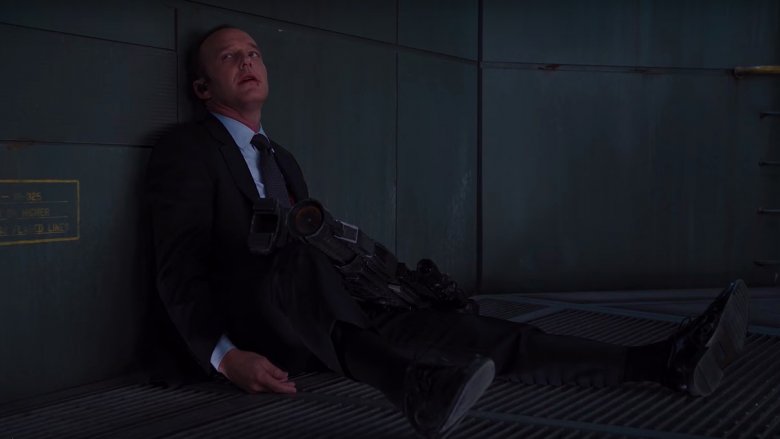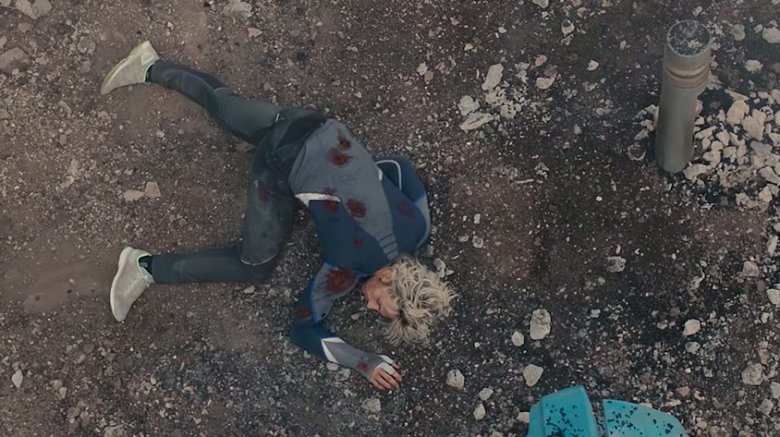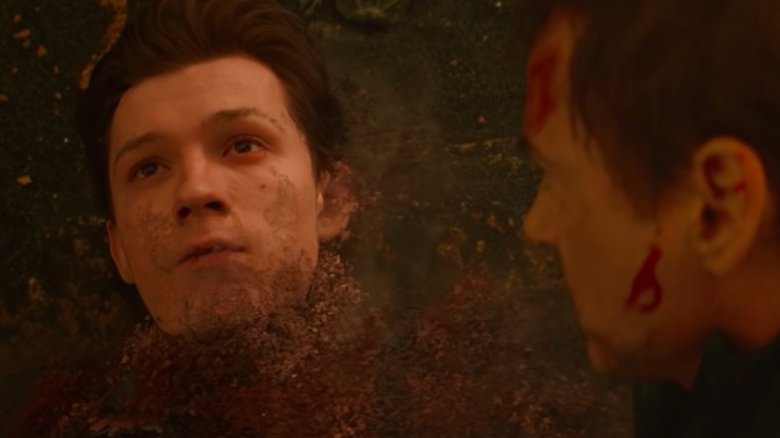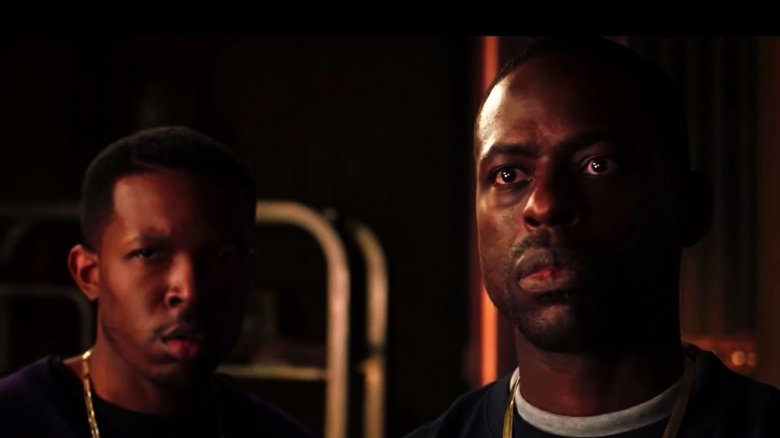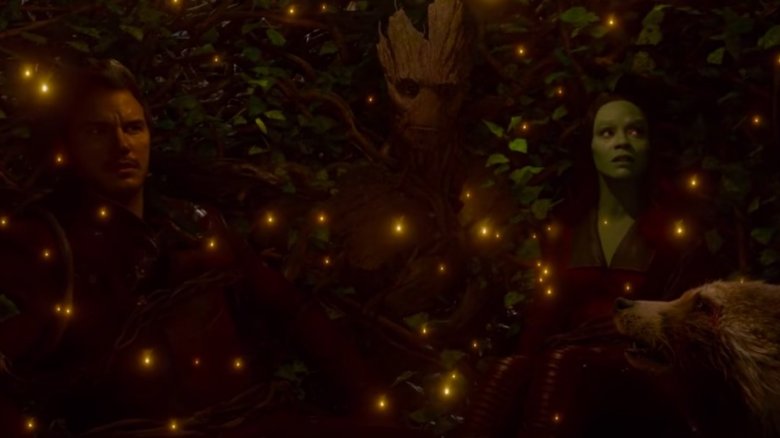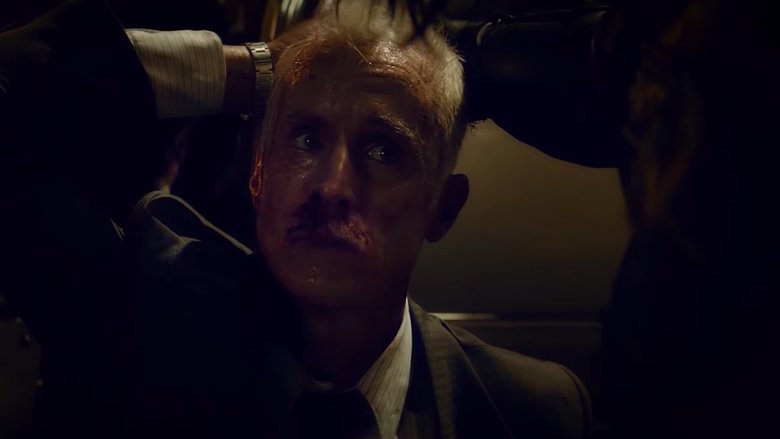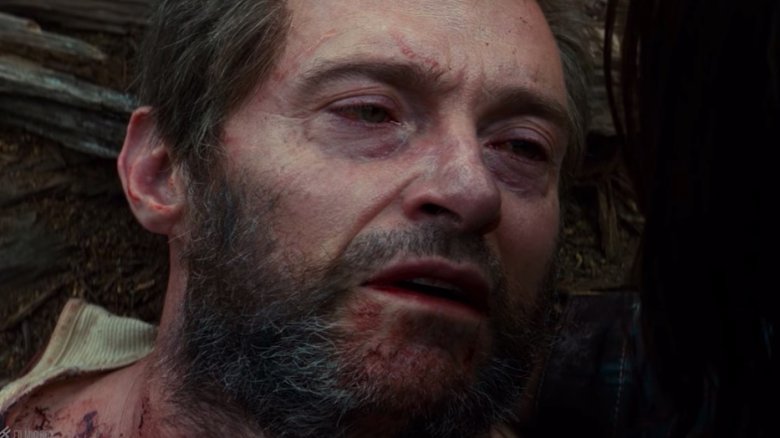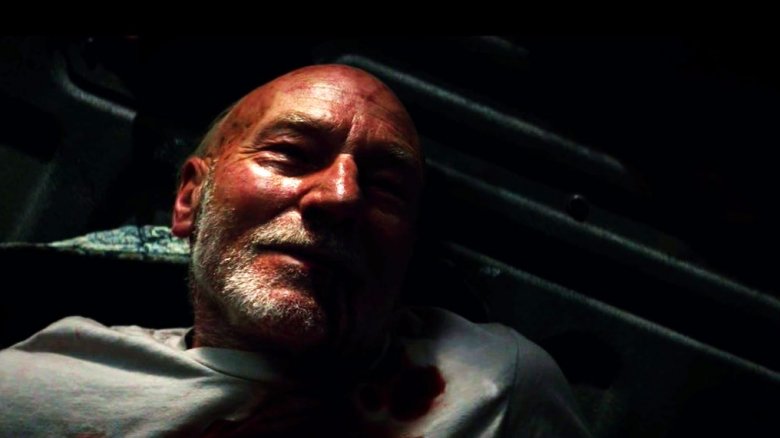The Saddest Marvel Movie Deaths
Even if you're not a fan of Marvel movies (and come on, what's wrong with you?), you have to admit that Marvel has really done something amazing with the superhero format. Somehow, we believe that these humans and humanoids who are endowed with unfathomable powers are also real, vulnerable, complicated people, and a lot of us develop actual emotional attachments to them. Don't worry, it's not weird. Maybe it's a little weird, but we all do it, just some of us more secretly than others.
So when our favorite Marvel movie characters die, it's rough. It hurts. We might even go through a period of mourning. And then once we're over it, we click on articles like this one and live through it all over again to process the grief. So just in case you've tried to forget, here they are again — the saddest Marvel movie deaths to ever make you cry in a dark room with a bunch of strangers.
Also, spoilers ahead.
When Scarlet Witch had to kill Vision
Prior to Infinity War, Marvel didn't exactly do a whole lot to invest us in the relationship between Vision and Scarlet Witch, maybe because if they had, theater employees would have had to work overtime mopping up all those devastated puddles of tragedy with a few sad pieces of popcorn floating around in them, which would have been the only remaining evidence of people who had gone to see Infinity War.
The fact that Scarlet Witch loved Vision is what made those final, awful moments of the battle so utterly devastating. "It's not fair," Vision tells her as she wrestles with the knowledge that she's going to have to destroy the Mind Stone. "It shouldn't be you, but it is. It's all right. You could never hurt me." And with that, Scarlet Witch fires up her destructive powers and uses them to shatter the Mind Stone, which kills Vision because of super-sciencey reasons explained in the movie but mainly because the Mind Stone is embedded in his forehead.
And then, just as we were all reeling from the awfulness of what Scarlet Witch has had to do, Thanos brings Vision back to life just long enough to pluck the Mind Stone out of his head, thus killing him a second time while Scarlet Witch looks on. Dang, Marvel. George R. R. Martin has nothing on you.
When Thanos traded Gamora's life for the Soul Stone
Gamora was so many different kinds of cool, and not just because she was two very bright complementary colors. She was smart, she was badass, and she loved dorky Peter Quill. No one wanted to see her character die, not even the guy who killed her.
What made Gamora's death so hard to watch was the fact that she didn't see it coming. She believed Thanos was incapable of feeling love and that he would never be able to obtain the Soul Stone because he had no one to sacrifice for it.
So poor Gamora realizes for the first time that her father loves her at the same time as she realizes what that means — that he's going to kill her and as a result of her death gain the power to wipe out half the universe. In desperation she tries to take her own life, but Thanos is way too clever to let that happen, and the knife she tries to stab herself with turns into a bunch of backyard play bubbles from the Dollar Store. And then Thanos says, in a voice that sounds genuinely distressed, "I'm sorry, little one," and pitches her unceremoniously off a cliff while tears stream down his face.
When Black Widow fought Hawkeye for the right to be sacrificed
In Avengers: Endgame we lose Black Widow in pretty much exactly the same way as we lost Gamora in the previous film, only this time the sacrificer (Hawkeye) is not so eager to do the deed. Black Widow dies after a struggle with Hawkeye because she's decided that as a father and husband his life is more important than hers, or at least it will be if the Avengers are successful at bringing everyone back from the dust.
So by now we're used to Red Skull and the whole "soul for a soul" thing he likes to go on about, but in Infinity War what he said first was "In order to take the stone, you must lose that which you love." It's too bad one of Hawkeye's powers didn't involve his bow having a personality and a soul because he definitely loves that thing.
When Iron Man snapped his fingers
If you sat through that one scene in Endgame without having to consciously work to prevent yourself from sobbing audibly and uncontrollably, then you are empty inside. Of all the Marvel movie deaths, none could ever be as devastating as the death of Iron Man, who implemented the finger-snap of doom so he could take out Thanos and his time-traveling army and who also suffered the horrible, horrible consequences of that action. Meanwhile, all of us moviegoers were simultaneously crying and feeling relieved and triumphant and giving Thanos the middle finger as he disintegrates into a cloud of his own comeuppance, and also kind of feeling sorry for him. Jeez, Marvel, are you going to pay everyone's therapy bills after this, too?
Now, superhero stories in general aren't exactly known for the concept of finality in death, so there are people saying that Iron Man will one day return. That kind of feels like wishful thinking, though. As the Hollywood Reporter argues, Iron Man should really stay deceased — anything else would be an insult to everything he sacrificed and a cheapening of that unforgettable moment. Farewell, Tony Stark.
When Yondu sacrificed himself to save Peter Quill
In the first Guardians of the Galaxy, Yondu wasn't super likeable because he was forever telling Peter Quill he ought to be grateful for not being eaten by Yondu's crew back when he was a kid growing up with space pirates. But even then there were clues about how Yondu really felt — Peter was like a son to him, even though he had to maintain his piratey persona while also trying to be a father figure.
Yondu makes up for all his bad behavior at the end of Guardians of the Galaxy Vol. 2, when he rescues Peter from the exploding planet that's also Peter's weird god-hippie-father Ego. "He may have been your father, boy, but he wasn't your daddy," Yondu says. But he has to get Peter back to his ship, and there's only one spacesuit. "I'm sorry I didn't do none of it right," Yondu tells Peter just before activating Peter's suit. "I'm damned lucky you're my boy." And then as the pair leave the atmosphere, Yondu slowly dies in the vacuum of space while Peter screams, "No, oh no!" and Yondu pats his cheek comfortingly, just like he might have done when Peter was a boy except for the part where he had to be all piratey all the time. It's okay, though, most of us didn't see that bit because of all the stupid tears.
When the Ancient One wanted to stay and watch the snow
Doctor Strange's Ancient One doesn't exactly go out of her way to be likeable. That's not her purpose, so why bother? Still, her death is a terrible loss not just for Doctor Strange, who's still trying to figure out all the things he can do, but for the safety and security of the entire universe. And it's heartbreaking, too, because the Ancient One knew exactly when it was going to happen, and how.
"I've spent so many years peering through time, looking at this exact moment, and I can't see past it," she tells Strange as they're standing together in astral form just outside the hospital room where her body is dying. "You'd think after all this time I'd be ready, but look at me. Stretching one moment out into a thousand, just so that I can watch the snow." Even if you aren't the Ancient One's top fan, that's got to get to you, at least a little.
When Agent Coulson died but not really
Everyone liked Agent Coulson because he had the air of an everyman and the soul of a badass. In The Avengers, Coulson threatens Loki with the world's manliest weapon, which is so gigantic it doesn't look like he should be able to lift it, let alone point it at anyone. "Even I don't know what it does," he tells Loki. And then Loki suddenly appears behind him and stabs him in the back. Shoot.
Coulson gets the last word, though, taunting Loki from where he's fallen with the world's manliest weapon still in his lap. "You lack conviction," he tells Loki, and then Loki starts to get pissed because that's what villains do when you criticize their character, and then Coulson surreptitiously fires the world's manliest weapon and Loki goes flying. "So that's what it does," he says.
But he's still not dead — Coulson doesn't finally shuffle off this mortal coil until Nick Fury tells him that shuffling off this mortal coil is not an option.
But guess what, he's still not dead because fans were so upset by that scene that Disney literally designed an entire TV show around the plot twist that technology was able to resurrect Agent Coulson. However you feel about that dumb little cop-out, though, his death in Avengers was still pretty awful.
When Quicksilver saved Hawkeye and some random kid
Long, long ago, Scarlet Witch had a brother and also a Russian accent. First she lost one of them, and then the other. The first loss was a little more tragic than the second one.
Scarlet Witch's brother was Quicksilver, who sacrificed himself in Age of Ultron in order to save Hawkeye and a little boy. It was a heartbreaking sacrifice, since Age of Ultron is the movie in which Quicksilver made both his debut and his exit, but producer Kevin Feige told MTV that his death was a necessary plot point, mostly because it helped Scarlet Witch's character arc. "It adds stakes to the ending of the film," he said. Also, Quicksilver got to utter some pretty great last words just before his bullet-riddled body fell to the ground: "You didn't see that coming."
What really made Quicksilver's death hard to take was Scarlet Witch's reaction to it — as he dies, she senses the loss and falls to her knees, howling with grief, while also taking out every bad guy in the room without actually trying. And then Scarlet Witch became everyone's favorite Avenger, the end.
When Spider-Man said, "I don't want to go"
Every single one of those deaths by finger-snap that happened at the end of Infinity War was devastating. Some of them were more devastating than others — teenager Groot dusted as he was reaching out for Rocket, just as he spoke his final words, which of course were "I am Groot" but translated on Vin Diesel's script were actually "Dad," so we'll just wait for a minute while you finish sobbing uncontrollably. The death everyone remembers from those final moments of Infinity War, though, was the death of Spider-Man.
"Mr. Stark, I don't feel so good," Spider-Man says as he stumbles backward. "I don't want to go. I don't want to go." And then he basically just disintegrates in Tony Stark's arms. Ooooooof.
Spider-Man's death was one of trillions across the universe, but it was arguably the most important of them all because in Endgame it was Stark's regret over the loss of Peter Parker that prompted him to leave his comfortable home with Pepper Potts and their daughter and try to undo Thanos' terrible act. It was tough to watch, but it made the final outcome of Endgame a possibility.
When N'Jobu got killed by his own brother
Truly great villains are the ones that aren't really evil. They make evil choices but they believe they're doing it all for the common good, which is why you sort of felt a little bit sorry for Thanos as he sat down in defeat and watched while his army turned into weird brown space dust. You know you did.
You felt sorry for Killmonger, too, as he watched the sun set on Wakanda and told T'Challa to bury him in the ocean. And Killmonger's father, N'Jobu, also had a sad death. He was killed by his own brother for his radical ideas, which were based entirely on his very appropriate sense of justice.
But there was more to N'Jobu's death than just a difference in ideology. T'Chaka kills him not just because he helped steal vibranium and because he has ideas that could threaten the existence of Wakanda, but because he's about to shoot Zuri, the king's loyal adviser.
N'Jobu's death is tragic and sad but also has far-reaching implications — it creates the film's primary villain: N'Jobu's little boy, who grows up angry and vengeful and ends up wasting his life on an unsuccessful quest for revenge.
When Groot said "We are Groot"
Here's another one of Marvel's truly amazing accomplishments: creating a beloved character who can only say three words. Well, five words if you count his line just before his epic death in Guardians of the Galaxy.
The Guardians' ship is plummeting toward certain death when Groot starts to do something magical. He turns into a huge mass of leafy vines and forms a sphere around all of his friends. Only Rocket seems to know what this means for him, and he begs Groot not to make the sacrifice. When Groot refuses, Rocket asks him why and Groot says, "We are Groot." And then the ship crashes and Groot becomes a pile of dry branches, everyone is saved, and the audience is all, "You suck, Marvel."
Groot's death would have been even more tragic except for Baby Groot -– who contrary to popular belief is not the reincarnated the form of original Groot, but his offspring. That fact was disappointing for a lot of fans, but at least we get an adorable miniature version of one of our favorite characters to help soften the blow of his loss.
When Tony Stark's parents were killed by the Winter Soldier
We all know what happens to rich orphans. They turn into reclusive genius billionaires who get raised by their butlers and become high-tech superheroes. In one comic universe, the billionaire superhero has a secret crime-fighting identity but otherwise spends all his time in the Bat Cave eating microwaveable lobster thermidor. In the other, the billionaire superhero has no secret identity at all and is sort of well-adjusted. Comparatively speaking.
The death of Tony Stark's parents was extra-super sad because Howard and Maria Stark are so helpless against their killer, who turned out to be Captain America's brainwashed friend Bucky Barnes. The elder Stark even recognizes his killer just before he gets his head bashed in by Barnes' robot arm. Barnes drags his lifeless body back to the driver's seat and then quickly dispatches Maria by choking her to death.
We hate this awful scene because it's awful, but also because of what it does to the younger Stark, who finds out years later that his parents' death wasn't a tragic car accident but a murder, thus kind of making him hate Cap for keeping it all a secret.
When Wolverine met that log
It's worth throwing a couple of X-Men in here because although the X-Men don't interact with the MCU they are still Marvel characters, which means they're well-written, relatable, and die tragically and often.
The one character we thought was safe, though, was Wolverine, whose main deal is that he's freaking immortal — he survived the bombing of Hiroshima for goodness sake, and was pretty much fine afterward. But Wolverine was vulnerable at the end of Logan because of adamantium poisoning, which interfered with his body's ability to heal itself. His death comes when the Wolverine clone called X-24 impales him on a log, just before his adopted daughter X-23 takes out the clone with an adamantium bullet.
It's awful whenever you have to watch a child experience the death of a parent, especially when the parent knows how vulnerable the child will be without him. "Don't be what they made you," he tells her, before commenting on the experience of death, which is something he once thought would never happen to him. "So this is what it feels like," he says, before taking his last breath. Weeeeelll, that sucked.
When Professor X was needlessly murdered by a Wolverine clone
Logan was rather a bloodbath of favorite characters, actually, because yet another mainstay of the X-Men universe met a sad death in that film — the great Professor X, who was taken out pretty viciously by the same guy who killed Wolverine himself.
In the film, Professor X is an old man of 90-plus who has a mutant form of Alzheimer's disease and is well on his way to a nonviolent death. But then he gets suddenly and pointlessly stabbed in the heart by the adamantium claws of X-24, Wolverine's homicidal clone. To make matters worse, he doesn't die right away — he dies in the flatbed of a pickup truck while Wolverine and X-23 are trying to make their getaway. Then he gets buried in an unmarked grave next to the interstate, so he doesn't even have a giant granite marker for all the X-Men to remember him by. Harsh.
